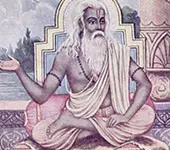Recommended for you
Mantra To Tackle Water Scarcity

इदं जनासो विदथ महद्ब्रह्म वदिष्यति । न तत्पृथिव्यां नो �....
Click here to know more..Desire has its own ways of laying a trap and finding its prey
 Click here to know more..
Click here to know more..
Vindhyeshwari Stotram

nishumbhashumbhamardineem prachand'amund'akhand'aneem. vane rane prakaashineem bhajaami vindhyavaasineem.....
Click here to know more..
English Topics
Rituals
Click on any topic to open
- 74 What happens after accident or suicide deaths?
- 73 Do Homas and Yajnas still Work in Kaliyuga?
- 72 How Do Remedial Homas Work?
- 71 Hindu Beliefs About Menstruation
- 70 The Significance Of Following Rules While Observing Vratas
- 69 Tamil Brahmin Wedding Rituals
- 68 Significance Of Turmeric And Kumkum
- 67 Medicinal Properties Of Panchamrita
- 66 Tamil Brahmin Death Rituals
- 65 Dana Mantra
Please wait while the audio list loads..
30
Ganapathy
Shiva
Hanuman
Devi
Vishnu Sahasranama
Mahabharatam
Practical Wisdom
Yoga Vasishta
Vedas
Rituals
Rare Topics
Devi Mahatmyam
Glory of Venkatesha
Shani Mahatmya
Story of Sri Yantra
Rudram Explained
Atharva Sheersha
Sri Suktam
Kathopanishad
Ramayana
Mystique
Mantra Shastra
Bharat Matha
Bhagavatam
Astrology
Temples
Spiritual books
Purana Stories
Festivals
Sages and Saints
26
15
13
Copyright © 2024 | Vedadhara | All Rights Reserved. | Designed & Developed by Claps and Whistles
